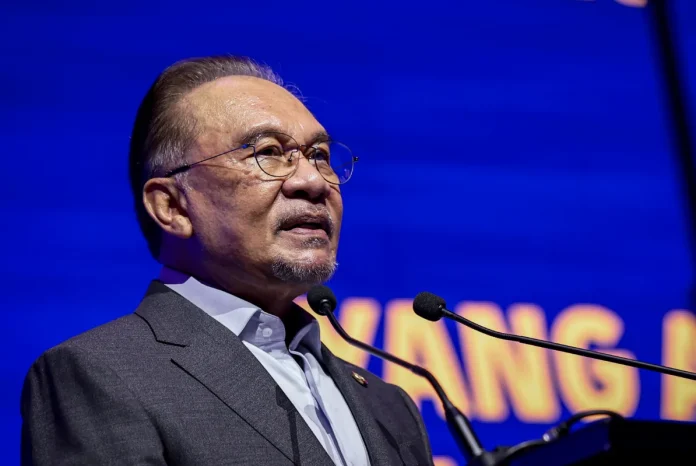Prime Minister Anwar Ibrahim climbs to 10th place in The World’s 500 Most Influential Muslims 2026, rising from 15th in previous year’s ranking.
KUALA LUMPUR: Prime Minister Datuk Seri Anwar Ibrahim has been ranked the world’s 10th most influential Muslim in the 2026 edition of The World’s 500 Most Influential Muslims, published by Jordan’s Royal Islamic Strategic Studies Centre (RISSC).
His rise to 10th place, up from 15th in the previous year’s listing, signifies growing international recognition of his leadership and enhances Malaysia’s standing on the global stage.
The publication features 50 of the world’s most influential Muslim individuals.
ALSO READ: Trump praises Anwar and Malaysia’s role in Thailand-Cambodia peace deal
Among them are the Emir of Qatar, Sheikh Tamim bin Hamad Al-Thani (1st); the King of Saudi Arabia, Salman bin Abdulaziz Al Saud (8th); and Indonesian President Prabowo Subianto (15th).
Furthermore, the RISSC noted that Anwar climbed to 7th place in the specific category of the world’s most influential Islamic leaders and politicians, advancing from 9th place last year, placing him ahead of President Prabowo (10th) and Egyptian President Abdel Fattah el-Sisi (13th).
The rankings assess a figure’s influence, defined as their ability to effect significant change within the Muslim world, whether through cultural, ideological, financial, or political means.
The impact is measured by its significance, which can be viewed as either positive or negative depending on perspective.
ALSO READ: PM Anwar’s single dot Facebook post draws praise for ASEAN leadership
The publication’s brief profile of Anwar highlighted his role in de-escalating border tensions between Thailand and Cambodia and his vocal advocacy for the Palestinian people against Israeli atrocities.
“Anwar helped build trust between Bangkok and Phnom Penh, reinforcing Malaysia’s image as a constructive peace broker in Southeast Asia.
Meanwhile, Anwar Ibrahim has been a vocal supporter of the Palestinian right to resist occupation.
“His meetings with Hamas officials (including the assassinated late Hamas leader Ismail Haniyeh) have drawn criticism from the USA.
“His social media posts offering condolences after the assassination of Ismail Haniyeh were taken down, prompting him to say: ‘Let this serve as a clear and unequivocal message to Meta: cease this display of cowardice and stop acting as instruments of the oppressive Zionist Israeli regime’, said the publication.
The following are among the 50 most influential Muslim figures in the world:
- Emir of Qatar, Sheikh Tamim bin Hamad Al-Thani
- Mufti and Leading Scholar, Pakistan, Justice Sheikh Muhammad Taqi Usmani
- Scholar and Founder of Dar Al-Mustafa, Tarim, Yemen, Sheikh Al-Habib Umar bin Hafiz
- Supreme Leader of the Islamic Republic of Iran, Grand Ayatollah Hajj Sayyid Ali Khamenei
- King of Jordan, King Abdullah II Ibn Al-Hussein
- Grand Sheikh of Al-Azhar University, Grand Imam of Al-Azhar Mosque, Egypt, Sheikh Dr Ahmad Muhammad Al-Tayyeb
- Türkiye President Recep Tayyip Erdogan
- King of Saudi Arabia, King Salman bin Abdul-Aziz Al-Saud
- President of the United Arab Emirates (UAE) Sheikh Mohamed bin Zayed Al Nahyan
- Prime Minister of Malaysia Datuk Seri Anwar Ibrahim
- Marja of the Hawza, Najaf, Iraq, Grand Ayatollah Sayyid Ali Hussein Al-Sistani
King of Morocco, King Mohammed VI - Scholar and Educator, Saudi Arabia, Sheikh Salman Al-Ouda
- Saudi Arabia’s Crown Prince Mohammad bin Salman bin Abdul Aziz Al-Saud
- Indonesian President Prabowo Subianto
- Leader and President of Jamiat Ulema-e-Hind, India, Maulana Mahmood Madani
- Sultan of Sokoto, Nigeria, Sheikh As-Sultan Muhammadu Sa’adu Abubakar III
- President of the Forum for Promoting Peace in Muslim Societies, Mauritania, Sheikh Abdullah bin Bayyah
- Chairman of Nahdlatul Ulama, Indonesia, Yahya Cholil Staquf
- Director of the National Intelligence Organization, Türkiye, Dr Ibrahim Kalin – Bernama








